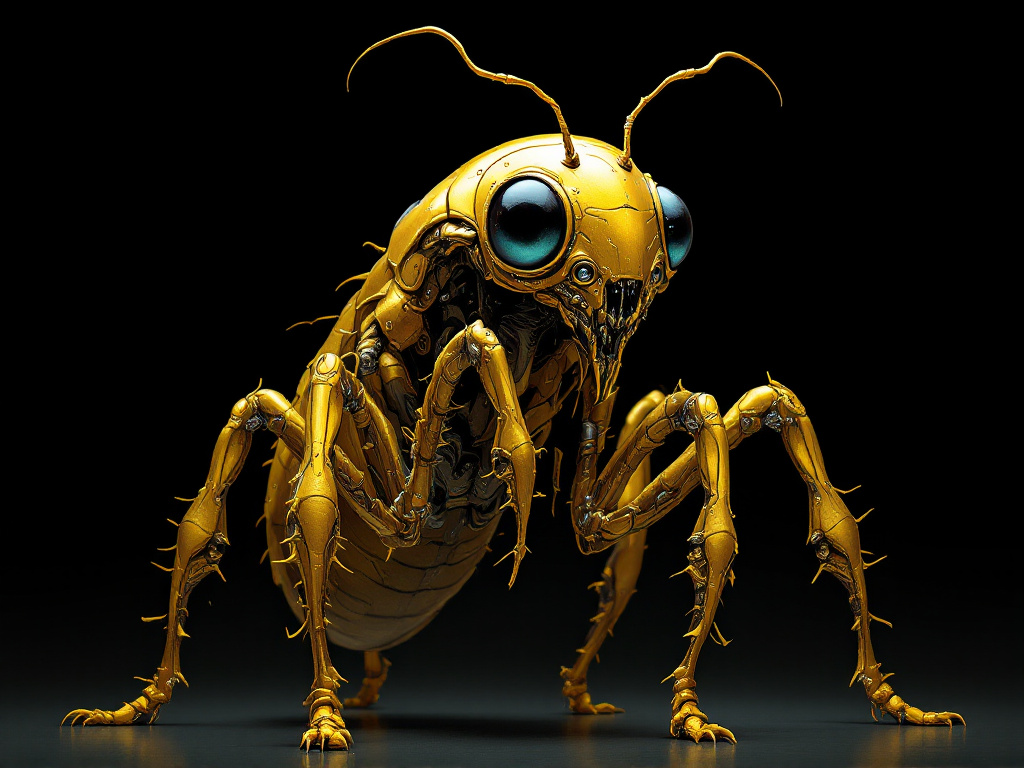Evolution has always been capricious and terrifying in its operation. Natural selection has wiped out entire species that failed to adapt to their environments or external factors. This also happened to the great rulers of the prehistoric world: the dinosaurs.
It is now well known that mammals inherited the Earth, but this was only due to a series of environmental factors, undeniably. But what if environmental factors had favored another species, another type of intelligence? Because there were other intelligent beings besides prehistoric mammals. Yes, them—the ones we often don't notice unless they become extremely annoying. We are talking about insects.
Today, we will continue our journey to the edges of reality, into a world where evolution did not follow the path of mammals, but that of insects. A fascinating scenario in which insect biology and culture are radically transformed, but the mind and intelligence remain at the center of everything. In this vision, the human being as we know it would not exist, but in its place, a sentient and evolved entity from small insects would dominate the planet.
The Biology of an Evolved Insect Being
The first question that arises concerns the internal biology of these beings. If we imagine an intelligent creature evolved from insects, we must consider how its body works. Insects already have a highly specialized and distributed nervous system, allowing them to perform complex tasks without a centralized brain. In this being, intelligence would not be confined to a single brain but distributed in various "cerebral nuclei" that allow different functions to be performed in parallel, creating a form of collective intelligence.
The respiratory and circulatory systems would also be radically different. Insects do not have lungs but a system of tracheae that carries air directly to the cells. Evolving into larger beings, these tracheae could expand, becoming more branched to support a more complex body. Similarly, the circulatory system would not have blood vessels but a substance called hemolymph, which transports nutrients and chemical signals, optimizing communication between the different "units" of the body.
From a movement perspective, these beings could maintain the rigid exoskeleton but more flexible than modern insects, allowing for more articulated mobility. Their legs could be multiple and specialized, adapted to different tasks: some for running quickly, others for grasping objects or building complex social structures. The physical appearance, therefore, would be very different from the human one: the segmented body, the large head with compound eyes and antennae, perhaps equipped with wings for short flights, would be able to perceive and interact with the environment in ways we cannot even imagine.
A Collective Intelligence
The most interesting aspect, however, is not just the biology but the psyche of these creatures. If we think of modern insects, we see that they have highly social and cooperative behaviors, as in the case of ants or bees. Evolving toward a more intelligent form of life, these beings would not be individualistic like us but would operate in a sort of "collective intelligence." Each individual would be like a cell of a larger organism, contributing with its task to the growth and well-being of the entire community.
The language would probably be chemical, based on pheromones and other substances, but also capable of communicating through vibrations or electromagnetic signals. A being with such a sensitive perception of the world would be capable of making quick decisions and organizing itself in a highly efficient manner, without the need for a central authority. Every action would be an immediate response to stimuli from the environment, creating a balance between the individual and the collective.
The Turning Point: The Ascension of Insects
But why did insects manage to prevail over mammals? One explanation could lie in a climatic change that made the Earth more favorable to insects than to mammals. Perhaps a period of global warming or low oxygenation allowed these beings to evolve more rapidly, taking advantage of their ability to quickly adapt to difficult conditions. Mammals, less able to withstand environmental challenges, may have seen a drastic reduction in their population, while insects evolved to occupy new territories and ecological niches.
Their rapid reproductive capacities and resistance to external factors made them the rulers of the planet. They may have also developed a technological advantage, not in metals and plastics, but in natural biotechnologies. Building structures with organic materials, exploiting symbiosis with other species, or even manipulating the environment through biological modifications would be the basis of an advanced civilization.
A New World, A New Society
These beings evolved from insects could have created a society profoundly different from ours, focused on cooperation rather than individualism. There would be no nation-states, but vast "hives" of collective intelligence interacting with each other. The social structure would be based on a very complex division of tasks, with castes specialized in different activities such as construction, exploration, or resource management. Each being would have had a specific role within a global social network.
The religion and philosophy of these creatures would probably focus on harmony, symbiosis, and continuous evolution. Their art might not be what we imagine, but composed of living biological structures that develop over time, communicating emotions and ideas through organic forms in constant change.
The perspective of a civilization evolved from insects offers a deep reflection on evolution, intelligence, and the very nature of "human being." Far from our anatomy and psychology, these beings show us a world where cooperation and adaptation are the true engines of evolution. Humanity, as we know it, is not the only possible form of intelligent life, and exploring these alternatives invites us to reflect on what truly defines intelligence, society, and culture.








Leave a Comment